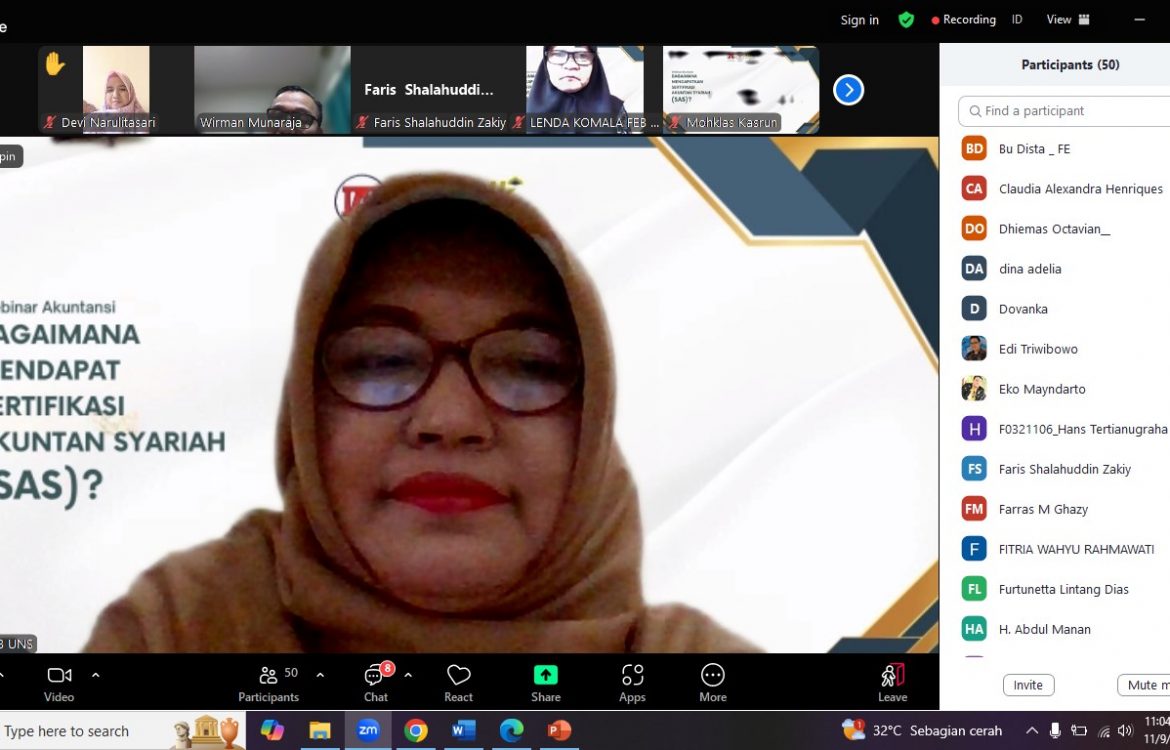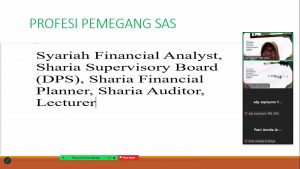
Islamic Economics and Finance Research Group of FEB UNS Delivers Material on How to Obtain Sharia Accounting Certification
The Islamic Economics and Finance Research Group (RG), Faculty of Economics and Business (FEB), Universitas Sebelas Maret (UNS), hosted an Accounting Webinar on Saturday, November 9, 2024, in collaboration with the Indonesian Institute of Accountants (IAI) Surakarta Branch and the Indonesian Association of Accounting Lecturers (ADAI) Central Java. The event was also supported by the Surakarta Regional Board of the Sharia Economic Society (MES), the Regional Executive Board of the Indonesian Association of Islamic Economists (IAEI) Central Java Province, and the Solo Raya Regional Board of the HMI Alumni Women’s Forum (PD Forhati).
The webinar entitled “How to Obtain Sharia Accounting Certification (SAS)?” attracted a total of 69 attendees, consisting of lecturers and students from various universities across Indonesia. Dr. Falikhatun, M.Si., Ak., SAS., Chair of the Islamic Economics and Finance Research Group, served as the main speaker for the occasion.
In her material presentation, Dr. Falikhatun emphasized the importance of Sharia Accounting Certification for accountants, especially for lecturers and students who intend to engage with the sharia-based industry, including both Islamic financial institutions and Islamic non-bank financial institutions (IKNB).
 “The purpose of SAS is to assess competency in sharia accounting, to serve as a quality benchmark for accountants seeking to understand sharia accounting, as a quality indicator for institutions looking to employ personnel with expertise in the field, and as a requirement for entry into certain professional roles in sharia accounting,” she explained.
“The purpose of SAS is to assess competency in sharia accounting, to serve as a quality benchmark for accountants seeking to understand sharia accounting, as a quality indicator for institutions looking to employ personnel with expertise in the field, and as a requirement for entry into certain professional roles in sharia accounting,” she explained.
Dr. Falikhatun further noted that, since 2020, obtaining the SAS certification requires passing two examination levels: Basic and Professional. To qualify for the Basic level, candidates must hold at least an undergraduate (S1) or Diploma IV degree in any discipline, as long as they are able to complete the exam. After passing the Basic level, participants may proceed to the Professional level. Only upon successful completion of the Professional level can they obtain the SAS title.
Accountants holding the SAS certification may pursue various career paths related to sharia accounting, such as Sharia Financial Analyst, Sharia Supervisory Board (SSB) member, Sharia Financial Planner, Sharia Auditor, and Lecturer. However, for positions on the SSB or Sharia Supervisory Board (Dewan Pengawas Syariah/DPS), an additional certification is required—specifically, DPS training and certification typically organized by the Indonesian Ulema Council (MUI) Institute.
This initiative is intended to motivate lecturers and students, particularly those aiming to be involved in the sharia business sector. It is also expected to encourage deeper understanding and practical engagement with sharia accounting, thereby opening up promising career opportunities.
In the long term, the program aspires to increase both competency and the number of lecturers and accountants who hold Sharia Accounting Certification, ultimately enhancing the strength and capacity of institutions served by sharia-accounting professionals.

